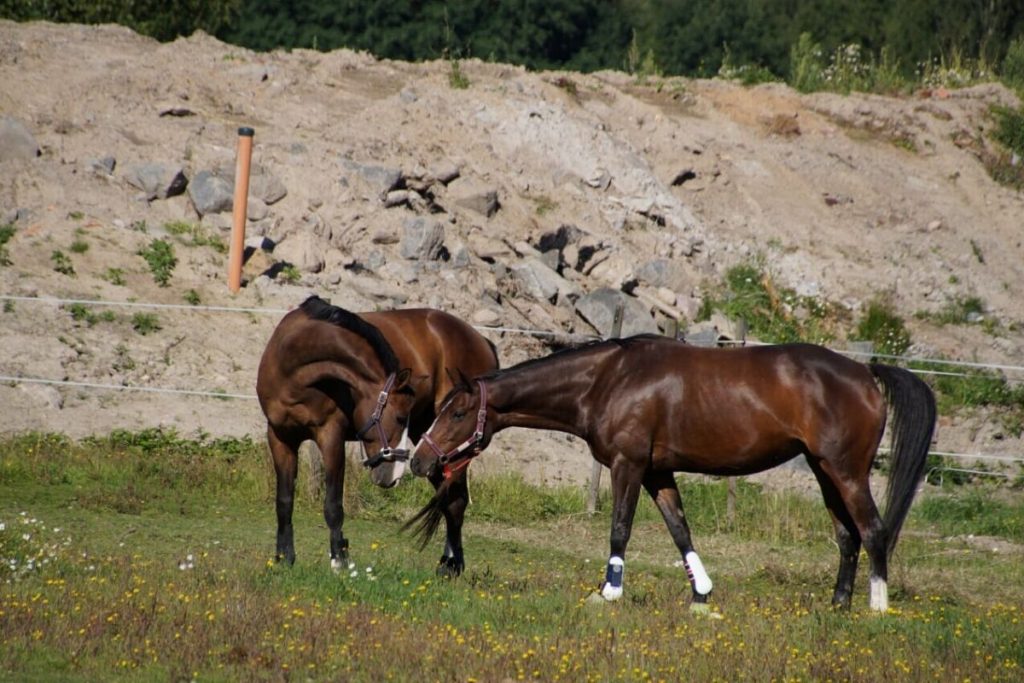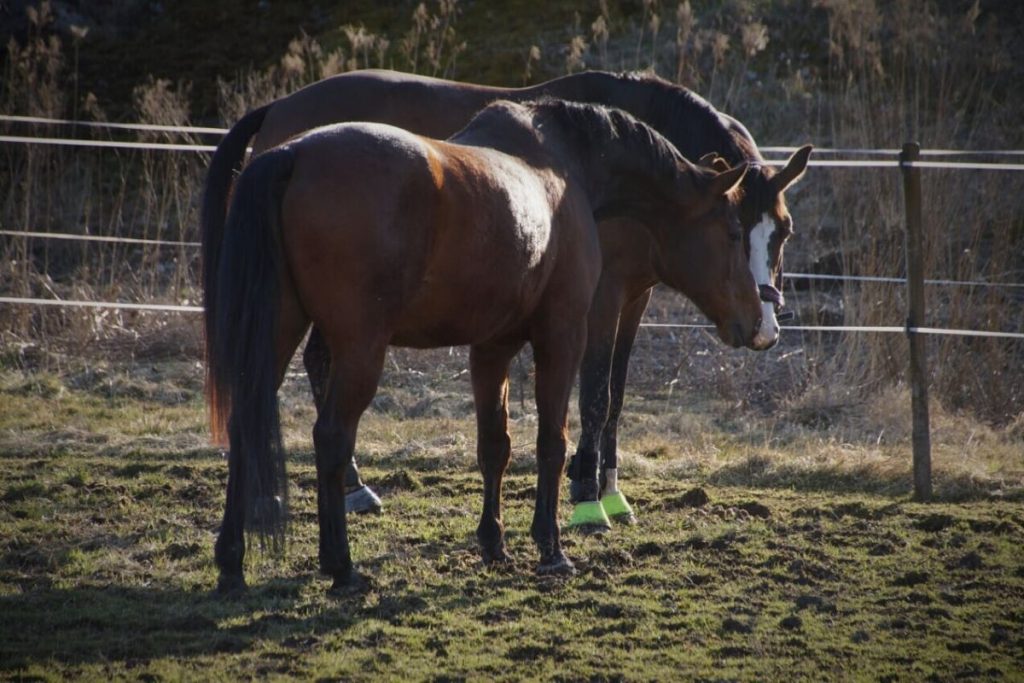In the wild, horses live in small herds. These herds have leaders, followers, and a social ladder that every horse adheres too. Horses are generally, at their happiest when they are able to interact with other horses, as this makes them feel safe.
So, do horses get lonely? Yes, when they are unable to interact with other horses and find themselves in a solitary environment, horses can get lonely and engage in destructive behaviors like stall walking, wood chewing, and paddock pacing.
It is better both physically and emotionally for your horse to be near other horses, however, there are some situations which don’t allow for this, whether it is due to economic reasons or horse personality.
Please keep in mind that some horses can live alone without getting lonely, but the majority of horses are not cut out to live alone. With this said, let’s look at how you can get a horse used to being alone, what type of companions work well with them, and how long they can be left alone for.

Tips on How to Get a Horse Used to Being Alone
⦁ Provide a Source of Entertainment. Boredom can be a major issue for solitary horses. One way to combat this is by purchasing stall toys to keep him or her entertained while they are in their stall for the night/day.
⦁ A jolly ball is a rugged, versatile, ball that can alleviate stall stress and boredom. You can get these in small and large sizes. If you go with a large one, it can be used in the pasture to promote movement.
⦁ A jolly stall snack system can be used to hang treats at wither level. This gives your horse enough room to get a few licks in to keep them interested in the toy. Just make sure that it is positioned far enough away from the side of the stall so that it cannot be pinned against the wall.
⦁ A spinning, wall-mounted toy works extremely well. The Boredom Breaker is a popular one that can be loaded up with treats. It spins as your horse licks it, keeping them entertained for hours. Just make sure to mount it at a natural and comfortable height.
⦁ Spread Feed Out in the Pasture. When horses are put out to pasture with others, they will move around a lot and play with another. To get your horse used to being alone, spread their feed out into different areas of the pasture. This will encourage them to walk around and get movement/stall boredom and restlessness.
⦁ Groom Them More! When you have your horse alone, they miss out on the grooming that other horses tend to provide when they are together in a herd. One way to help with this is by grooming them more, specifically, currying them as this will feel similar to what other horse’s feel like when they groom one another. Do this regularly!
⦁ Test the Radio Out in the Barn. Try seeing how you horse reacts to different types of music. Some horses find music to be very soothing and if yours does, you can use a radio to break up the silence during the day in the barn. When you are not in the barn, it is best to unplug the radio to make sure that nothing untoward happens. When playing music, keep it gentle and soft.
⦁ Spend Time with Your Horse Every Day. Even if you are unable to ride your horse every single day, try to spend time with them. Your presence is enough to break up the loneliness. Try doing groundwork and hand walking when you are unable to ride and visit them in the barn or out in the pasture when you can.
⦁ When Out on the Trails – Bring Other Riders. When you are able to take your horse out onto the trails, invite other riders out with you. This gives your horse a chance to socialize, exercise, and a change of pace with nice scenery. Having that contact time with other horses goes a long way to calm them down.
Do Horses Need a Companion?
Ideally, yes. While some horses can handle being completely alone, most horses will be infinitely happier and have a higher quality of life if they have a companion.
This is because horses are social animals and will endure less stress if they have another animal nearby. Horses do best if they have other horses around, however, you can have non-equine companions as well.
⦁ Dogs are fantastic companions in so long as they do not nip or chase your horse. A well-trained dog can go on trail rides with you, keep the barn safe from strangers and predators, and develop a close bond with your horse. While dogs may prefer to be in the house with you, leaving them in and around the barn while you are away, works well.
⦁ Goats are extremely popular because they are clever and share some of the same behavioral characteristics as horses. Plus, goats love being part of the herd. Just keep in mind that very small goats tend to escape rather easily and can be mischievous.
⦁ Miniature donkeys and horses are excellent companions. They eat the same foods as horses, will happily reside in the barn with your horse, and also enjoy being a part of the herd. Some horses will not get along with donkeys though due to their constant braying.
⦁ Cats are an excellent option because they become quite close to their equine friends and can keep rodents at bay. However, they do not travel as well as dogs.
Also consider smaller breeds of cows, sheep, llama, and alpacas.

How Long Can You Leave a Horse Alone?
The answer to this is dependent on how well your horse copes at being alone. Some horses cannot stand being alone and will need a companion or another horse to keep them from acting out. Others may be okay to be alone for a few weeks or even a few months.
If your horse is used to having a buddy, it is likely that they will not be able to be left alone for any amount of time.
If you are on a property that has pastures and paddocks, where your horse can see other horses in the distance, you may be able to get away with leaving them alone for an extended period of time.
The trick to figuring out how long you can leave them alone is to watch their behavior. If you have a horse that is young or gets spooked easily, leaving them unattended for longer than 24-hours is a no-go.
Do Horses Get Emotionally Attached to Their Owners Like Dogs?
Yes, horses do become emotionally attached to their owners, but the depth of the connection depends on several factors including the amount and type of interaction the owner has with the horse.
The connection and trust that a horse forms with the owner is mostly due to the contact that they have with the owner, via riding, grooming, and general care.
⦁ Horses can show recognition when their owner approaches them.
⦁ Horses can become jealous or show signs of possession when new horses come into the picture.
⦁ Horses can be territorial of their owners.
⦁ Horses can react badly after being away from their owners for long periods of time.
⦁ Horses can show approval towards their owner due to treating them as the leader of the herd.
The difference between the emotional connection of an owner and their dog and an owner and their horse, is that dogs will mourn or pine the loss of their owner, display symptoms of stress at the loss, and try to sit with you/hug you when they sense that you are sad.
While humans can emotionally bond with dogs and horses, the bond comes from different aspects of interaction and manifests in different ways. Common interactions that create the bond in both dogs and horses include feeding, training, spending time with, and walking.
